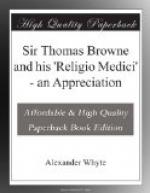a Theist rather than a Christian: he is a moral
and a religious writer rather than an evangelical
and an experimental writer. And in saying this,
I do not forget his confession of his faith.
’But to difference myself nearer,’ he
says, and ’to draw into a lesser circle, there
is no Church whose every part so squares unto my conscience:
whose Articles, Constitutions, and Customs seem so
consonant unto reason, and as it were framed to my
particular Devotion, as this whereof I hold my Belief,
the Church of England: to whose faith I am a sworn
subject, and therefore in a double Obligation subscribe
unto her Articles, and endeavour to observe her Constitutions.’
The author of the Religio Medici never writes
a line out of joint, or out of tone or temper, with
that subscription. At the same time, his very
best writings fall far short of the best writings
of the Church of England. Pater, in his fine
paper, says that ’Sir Thomas Browne is occupied
with religion first and last in all he writes, scarcely
less so than Hooker himself,’ and that is the
simple truth. Still, if the whole truth is to
be told to those who will not make an unfair use of
it, Richard Hooker’s religion is the whole Christian
religion, in all its height and depth, and grace and
truth, and doctrinal and evangelical fulness:
all of which can never be said of Sir Thomas Browne.
I can well imagine Sir Thomas Browne recreating himself,
and that with an immense delectation, over Hooker’s
superb First Book. How I wish that I could say
as much about the central six chapters of Hooker’s
masterly Fifth Book: as also about his evangelical
and immortal Discourse of Justification!
A well-read friend of mine suddenly said to me in
a conversation we were holding the other day about
Sir Thomas Browne’s religion, ‘The truth
is,’ he said, ’Browne was nothing short
of a Pelagian, and that largely accounts for his popularity
on the Continent of his day.’ That was
a stroke of true criticism. And Sir Thomas’s
own Tertullian has the same thing in that most comprehensive
and conclusive phrase of his: anima naturaliter
Christiana. But, that being admitted and
accepted, which must be admitted and accepted in the
interests of the truth; this also must still more
be proclaimed, admitted, and accepted, that when he
comes to God, and to Holy Scripture, and to prayer,
and to immortality, Sir Thomas Browne is a very prince
of believers. In all these great regions of
things Sir Thomas Browne’s faith has a height
and a depth, a strength and a sweep, that all combine
together to place him in the very foremost rank of
our most classical writers on natural and revealed
religion. Hooker himself in some respects gives
place to Sir Thomas Browne.




